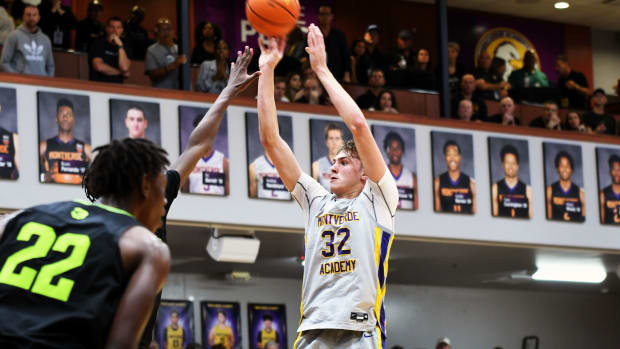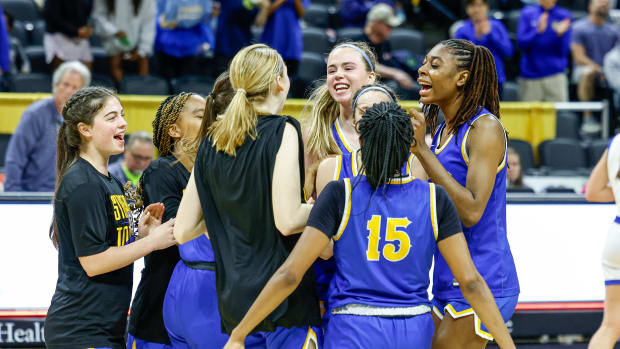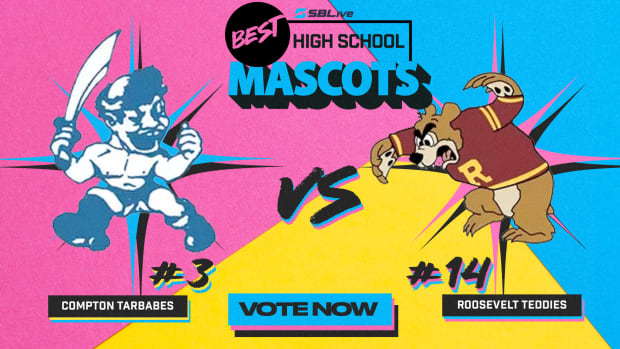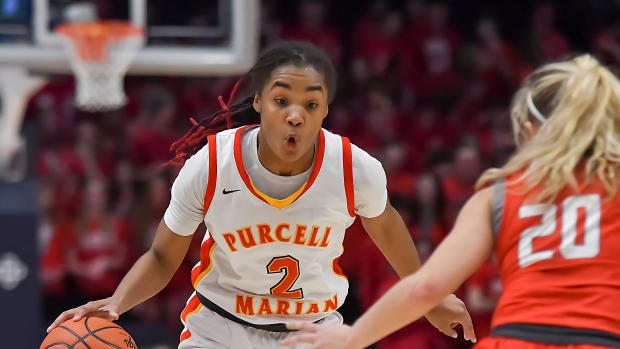Refugee Ornella Kero caps harrowing life journey with unlikely Idaho high school wrestling state title
NAMPA, Idaho - Ornella Kero needed just a moment to herself.
The Boise High School senior briefly turned away from the official, her opponent and the 12,000-plus screaming fans inside the Ford Idaho Center. She collapsed to her knees, put her head on the mat and covered her face.
This was Kero’s first state title, but these were years worth of emotions that came pouring out. Because she could have very easily not even been there in the first place.
From fleeing her home country as a child to being homeless up until only a few months ago, Kero overcame all of it on her way to a 4-2 decision over Coeur d’Alene’s Cara Brown in the girls 152-pound final at the Idaho state wrestling championships Saturday night.
“The thing I can say about Ornella is, she’s one of the most determined and hardworking individuals and people don’t see it,” Boise head wrestling coach Chuck Bousquet said. “They only see the surface, but when you know what’s going on behind the scenes, you realize how tough she is.”
Kero and her family fled Cameroon when she was 6 years old. War ravaged the Central Africa nation at the time.
“I saw people running from their houses,” Kero said.
They relocated nearly 400 miles to a refugee camp in Bangi where things weren’t much better. She recalls having to carry her younger sister on her back just to find water. Kero also recalls overhearing a family member talking about how she would have an arranged marriage - at age 10.
It would have meant leaving school in order to clean, cook and eventually raise children.
“First and foremost, I was African, and this was the way it was supposed to be,” Kero wrote in a letter.
Luckily, Kero and her family’s refugee application to the United States was approved. So in June of 2011, they arrived in Boise.
The move came with its own challenges, though.
Kero was unable to really have a normal childhood over there, either. She had to quickly learn English in order to help with her parents’ language barrier. Kero was relied upon for such things as translating for medical appointments and having to write out the rent checks each month.
But she eventually found a semblance of normalcy in the form of wrestling.
Kero started in eighth grade. It was then that she caught the attention of Bousquet.
“We do a big middle school tournament at North Junior High and I saw her and her two friends who had just got into wrestling. I saw them just beating up on some boys,” he said. “I thought it was awesome and I introduced myself and told her I can’t wait to see her in the program.”
However, even that was nearly taken away from her as well.
During the 2020 coronavirus pandemic, her mother was having medical problems and had to return back home to Africa. Since her father worked full time and into the wee hours of the night, Kero now had the added responsibility of managing a household.
She had to make sure her four younger siblings (three brothers, one sister) went to school, had babysitting and enough to eat for that matter. And when the bills kept coming in, Kero was asked to get a job, too.
It still wasn’t enough to avoid an eviction notice in November of 2021.
The family ended up at a homeless shelter and in a rough side of town nonetheless. Kero had to walk through it late at night on her way home from work as a dishwater.
“I heard some gunshots before and I thought that day was my last day,” Kero said.
All of it left little to no time for school or wrestling.
“I didn’t think I’d finish high school. I didn’t think I would be able to get through because my grades were not the best. My GPA wasn’t there,” Kero said. “At one point I thought, ‘Let me just get out of school and just take care of my family.’”
But her coaches wouldn’t let her quit school or wrestling even though she was now ineligible. Especially Bousquet, who related to Kero. He came from a low-income family and knew all too well the challenges that come from that.
He, along with Boise girls wrestling coach Jeff Dinwiddie, encouraged her just to come in when she could. Even if that meant only being there for minutes at a time. Bousquet particularly credited Dinwiddie with getting Kero back in the classroom and on the mat.
“She showed up every single day to practice. She was there warming up with her teammates. She never left the team,” Bousquet said. “We kind of kept pushing that you need to be a part of this. And she totally bought into that too. I think it shows her passion for the sport.”
And after two years of really not being able to compete, Kero made a triumphant return last year.
Kero won the Charlie Anthony Memorial and the district championship. She also took second place at state, third at the Jaybird Memorial and third at Rollie Lane.
Her personal circumstances also changed for the better.
Her mom returned home and the family was able to get into an actual home again. She was able to quit her job to just focus on school and wrestling as well
What a difference it made, too.
She won the Ardis E Nash Memorial, the Wiley Dobbs Invitational and the Tiger-Grizz Invitational. But her crowning achievement came Saturday.
Kero, who entered as the No. 2 seed with a 34-5 record, dominated on her way to the finals despite dealing with a nagging shoulder injury that kept her out of districts. She made her way there by pinning three opponents, two of whom were in the first round.
While the championship bout proved more difficult, the result was never really in doubt. Following a scoreless first round, Kero recorded a takedown just five seconds into the second period for a 2-0 lead.
Brown cut the lead in half with an escape point later in the period. But Kero picked another takedown early in the third and held her down until there were only two seconds remaining.
For the tournament, Kero only allowed two offensive points on her way to running away with a title that seemed not that long ago, impossible.
“I learned that I’m very strong and capable of anything,” Kero said. “Not a lot of people get this opportunity, so I feel like I should just keep going as far as I can with this. I owe it to myself and everyone else who never stopped believing in me.”
Kero is now hoping to go to school and wrestle for Pacific University in Oregon.
“If I’m ever fortunate enough to have a daughter, I hope she’s half the woman Ornella Kero is,” Bousquet said. “The fact that she’s doing this, having aspirations outside of this place, I think really shows what hard work can do even when you kind of get dealt a bad hand.”




